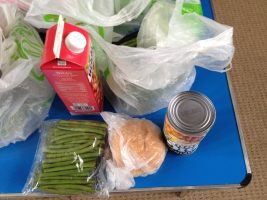WITNESSING children relying on food banks, Dr Kingsley Purdam speaks to Quays News about his research of Britain’s food poverty crisis in Manchester.
Children living in poverty is heart-breaking enough, but living in food poverty is much worse. The research, conducted by Dr Purdam, sheds insight to this problem that affects so many families in the UK and Manchester.
Looking at National Survey data, a team of social statistic researchers studied proxy measures to gather data on affordability and skipping meals that might show how deep the UK has engulfed in food poverty.
Social statistics researcher Dr Kingsley Purdam said: “We also spent time in food banks in the North West of England, and that involves observing what goes on and interviewing people who are using food banks and interviewing the volunteers who run them.”
Dr Purdam’s research showed a growth in the number of food banks across the UK, as well as Manchester.
“Across the UK as a whole, there has been a growth in a number of food banks,” Purdam said. “And we can see that from Trussell Trust data, which is the national organisation which runs food banks.”
As well as Trussell Trust, there are also many other food banks, often run independently by religious organisations and community groups.
“There are lots of independent food banks, as well,” Purdam told Quays News. “Set up in the back of churches or mosques or community groups.”
Dr Purdam’s research took him to the areas around the North West, where they saw three times as many independent food banks ran by churches and community groups, compared to the amount of Trussell Trust food banks.
These statistics mean it is impossible to figure the depth of Manchester’s food poverty crisis, however, Dr Purdam belives there has been a lot of innovation to conquer the problem.
“There’ lots of, what you might call, innovative approaches at the moment,” Purdam said. “Food banks aren’t just places where you go and collect a food parcel – you can get advice and support.”

His visit to food banks across the North West taught Dr Purdam that people find shame in relying on the service. Dr Purdam explained that people are reluctant to go to food banks: “Lots of people had been reluctant to go or didn’t want to be seen going, didn’t want their neighbours to see them,” Purdam said. “Because of this embarrassment that they weren’t able to feed themselves or their children.”
Children are at the heart of food poverty in the UK and Manchester, and Dr Purdam and his team weren’t prepared to face this reality.
“We weren’t very well prepared to encounter children in a food bank, so it took us by surpirise,” Purdam told Quays News. “But, they were just regular children.
“They seemed pretty subdued in that particular environment in my view, and we picked up on this in our interviews with parents and carers.
“The Trussell Trust say that say about 200,000 children in the last six months had been given food parcels, so if you look over a year that’s nearly half a million children.”
Across the country, there are various schemes to assist children with insecurity at food banks.
“There’s breakfast clubs, there’s attempts to tackle insecurity in the summer holidays for children who would normally be entitled for free school meals,” Purdam said. “So, it’s really shocking to see children forced into a food bank.”















Recent Comments